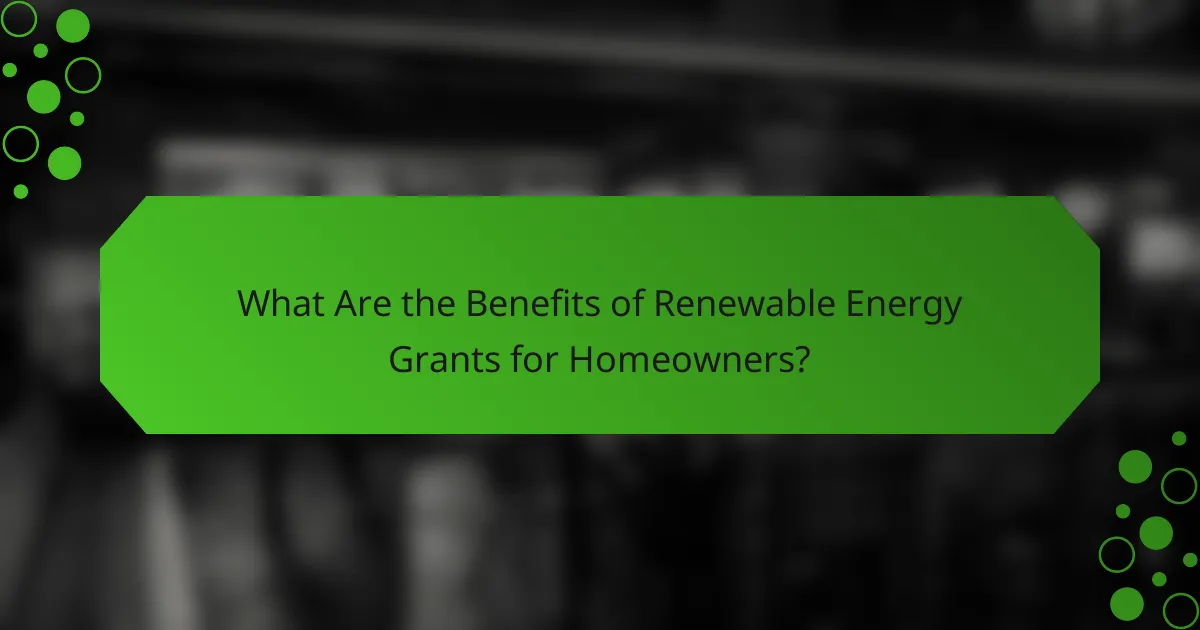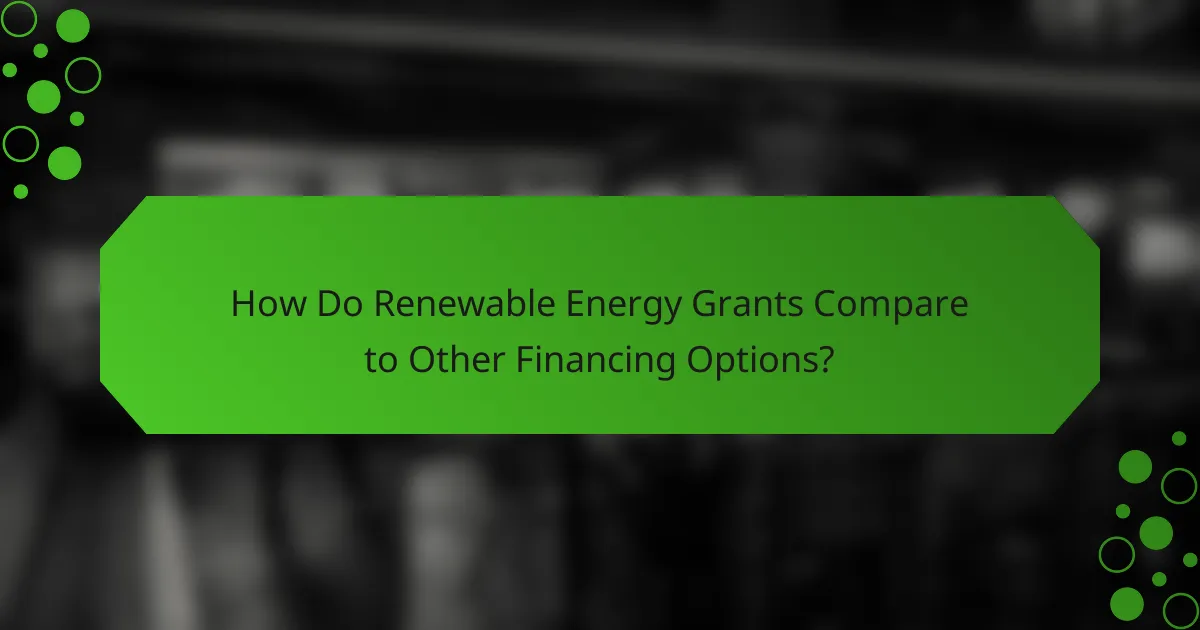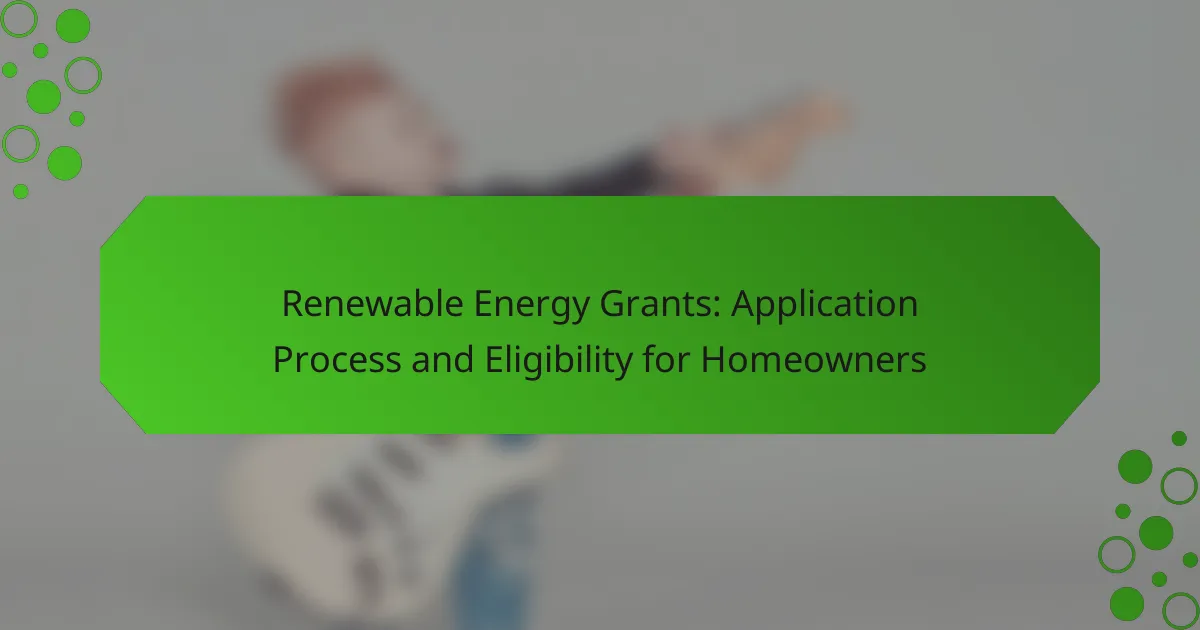Homeowners have the opportunity to access various renewable energy grants designed to assist with the installation of energy-efficient systems like solar panels and wind turbines. These grants can significantly lower upfront costs, making sustainable energy solutions more attainable. To successfully apply, homeowners must navigate specific application processes and meet eligibility criteria, including homeowner status and income limitations.

What Are the Available Renewable Energy Grants for Homeowners?
Homeowners can access various renewable energy grants to support the installation of energy-efficient systems, such as solar panels and wind turbines. These grants can significantly reduce upfront costs and encourage the adoption of sustainable energy solutions.
Federal Solar Investment Tax Credit
The Federal Solar Investment Tax Credit (ITC) allows homeowners to deduct a percentage of the cost of solar panel installations from their federal taxes. As of 2023, this credit is set at 30%, making it a substantial financial incentive for those considering solar energy.
To qualify, the solar system must be installed on your primary or secondary residence and must meet specific requirements set by the IRS. Homeowners should keep detailed records of their installation costs to ensure they can claim the full benefit.
State-Specific Renewable Energy Grants
Many states offer their own renewable energy grants to encourage homeowners to invest in clean energy technologies. These grants can vary widely in amount and eligibility criteria, often depending on the state’s energy policies and budget.
For example, states like California and New York provide significant financial assistance for solar installations, while others may focus on wind or geothermal energy. Homeowners should check their state’s energy office website for specific programs and application processes.
Local Utility Incentives
Local utility companies frequently provide incentives for homeowners who install renewable energy systems. These incentives can include rebates, performance-based incentives, or even financing options that make renewable energy more accessible.
Homeowners should contact their utility provider to learn about available programs, as these can differ based on location and energy needs. Participating in utility programs can often complement federal and state grants, maximizing financial benefits.
Nonprofit Organization Grants
Various nonprofit organizations offer grants to support renewable energy projects for homeowners, particularly in underserved communities. These grants often focus on promoting sustainability and reducing energy costs for low-income households.
Homeowners interested in these opportunities should research local nonprofits that focus on energy efficiency or environmental sustainability. Applying for these grants may involve demonstrating financial need or a commitment to energy conservation practices.

How Can Homeowners Apply for Renewable Energy Grants?
Homeowners can apply for renewable energy grants by following specific application processes set by various government and private organizations. These grants often help offset the costs of installing renewable energy systems, making them more accessible for residential use.
Online Application Processes
Most renewable energy grants require homeowners to complete an online application. This typically involves visiting the relevant government or organization website, creating an account, and filling out the application form with necessary details about the project and personal information.
Some programs may offer a step-by-step guide or video tutorials to assist applicants. It’s essential to ensure that you are applying through official channels to avoid scams.
Required Documentation
When applying for renewable energy grants, homeowners generally need to provide several documents. Common requirements include proof of property ownership, detailed project plans, and estimates from contractors for the installation of renewable energy systems.
Additionally, applicants may need to submit financial documents to demonstrate their eligibility for the grant, such as income statements or tax returns. Always check the specific requirements for the grant you are applying for, as they can vary significantly.
Application Deadlines
Application deadlines for renewable energy grants can vary by program and region. Many grants operate on a fiscal year basis, with deadlines typically falling in the late spring or early summer months.
Homeowners should mark these deadlines on their calendars and prepare their applications well in advance to avoid last-minute issues. Some grants may offer rolling applications, while others may have specific windows for submission, so it’s crucial to stay informed about the timelines relevant to your area.

What Are the Eligibility Criteria for Renewable Energy Grants?
To qualify for renewable energy grants, homeowners must meet specific criteria that typically include homeowner status, property type, and income limitations. Understanding these requirements is essential for a successful application process.
Homeowner Status Requirements
Applicants must be the legal owners of the property where the renewable energy system will be installed. This means that tenants or renters are generally not eligible for these grants. Homeowners should have clear documentation proving ownership, such as a title deed or mortgage statement.
In some cases, grants may also require that the homeowner resides in the property as their primary residence. This stipulation ensures that the benefits of the renewable energy installation are directly realized by the homeowner.
Property Type Eligibility
The type of property plays a significant role in grant eligibility. Typically, single-family homes, townhouses, and certain multi-family units may qualify for renewable energy grants. However, properties that are primarily commercial or industrial are usually excluded.
Additionally, the property must meet specific energy efficiency standards or codes set by local regulations. Homeowners should check with their local energy authority to ensure compliance before applying for grants.
Income Limitations
Many renewable energy grants include income limitations to prioritize assistance for low- to moderate-income households. These limits can vary widely based on local regulations and the specific grant program. Homeowners should verify the income thresholds applicable in their area.
To determine eligibility, applicants may need to provide documentation of their income, such as tax returns or pay stubs. It’s advisable to gather this information early in the application process to avoid delays.

What Are the Benefits of Renewable Energy Grants for Homeowners?
Renewable energy grants provide homeowners with financial assistance to install energy-efficient systems, reducing both upfront costs and long-term energy expenses. These grants can lead to substantial savings, increased property value, and a positive environmental impact.
Financial Savings on Installation
One of the primary benefits of renewable energy grants is the significant financial savings they offer on installation costs. Homeowners can receive funding that covers a portion of the expenses for systems like solar panels or geothermal heating, making these technologies more accessible.
For instance, grants may cover anywhere from 10% to 50% of the installation costs, depending on the program and the homeowner’s income level. This financial support can make a substantial difference, especially for those on a tight budget.
Increased Property Value
Installing renewable energy systems can enhance a home’s market value. Properties equipped with solar panels or energy-efficient heating systems often attract buyers looking for lower utility bills and sustainable living options.
Studies suggest that homes with renewable energy installations can see an increase in value ranging from 3% to 15%. This added value can be particularly beneficial when selling the property, as energy-efficient homes are increasingly in demand.
Environmental Impact
Renewable energy grants not only benefit homeowners financially but also contribute positively to the environment. By utilizing clean energy sources, homeowners can significantly reduce their carbon footprint and reliance on fossil fuels.
For example, switching to solar energy can decrease greenhouse gas emissions by several tons annually, depending on the system’s size and energy consumption. This shift not only helps combat climate change but also promotes a healthier community and planet.

What Are Common Challenges in the Grant Application Process?
Homeowners often face several challenges when applying for renewable energy grants, including complex application forms, limited funding availability, and long processing times. Understanding these obstacles can help applicants navigate the process more effectively.
Complex Application Forms
Many grant applications require detailed information and documentation, making the forms complex and time-consuming to complete. Applicants may need to provide proof of income, project plans, and even technical specifications for the renewable energy systems they intend to install.
To simplify the process, homeowners should carefully read the application guidelines and prepare all necessary documents in advance. Utilizing checklists can help ensure that no required information is overlooked, which can prevent delays or rejections.
Limited Funding Availability
Funding for renewable energy grants can be quite limited, often leading to a competitive application process. Many programs have a fixed budget, and once the funds are exhausted, no additional grants will be awarded until the next funding cycle.
Homeowners should research multiple grant options and apply to several programs to increase their chances of receiving funding. Staying informed about application deadlines and funding announcements can also help applicants act quickly when new opportunities arise.
Long Processing Times
The time it takes to process grant applications can vary significantly, often ranging from several weeks to several months. This delay can be frustrating for homeowners eager to start their renewable energy projects.
To mitigate the impact of long processing times, applicants should plan their project timelines accordingly. Keeping in touch with grant administrators for updates can also provide insight into the status of an application and any potential issues that may arise.

How Do Renewable Energy Grants Compare to Other Financing Options?
Renewable energy grants provide direct financial assistance for homeowners looking to invest in clean energy solutions, often requiring no repayment. Unlike loans or credit options, which incur interest and must be paid back, grants can significantly reduce the upfront costs of solar panels, wind turbines, and other renewable technologies.
Types of Renewable Energy Grants Available
Homeowners can access various types of renewable energy grants, including federal, state, and local programs. Federal grants, such as those offered by the U.S. Department of Energy, often focus on specific technologies like solar or geothermal energy. State and local grants may vary widely in availability and amount, so it’s essential to research options specific to your area.
Some grants are designed for low-income households or specific demographics, while others are open to all homeowners. Understanding the types of grants available can help you identify the best opportunities for funding your renewable energy project.
Eligibility Criteria for Homeowners
Eligibility for renewable energy grants typically depends on several factors, including income level, property type, and the specific technology being installed. Many programs require homeowners to demonstrate financial need or to meet certain energy efficiency standards before receiving grant funds.
Homeowners should check the specific eligibility requirements for each grant program, as they can vary significantly. For example, some grants may only be available for primary residences, while others might include second homes or rental properties.
Application Process for Renewable Energy Grants
The application process for renewable energy grants usually involves several key steps. First, homeowners must gather necessary documentation, such as proof of income, property ownership, and project proposals. Next, applicants often need to complete a detailed application form, which may require information about the intended renewable energy system and its expected benefits.
After submitting the application, homeowners may need to wait for a review period, which can range from a few weeks to several months. It’s crucial to follow up on the application status and be prepared to provide additional information if requested.
Common Pitfalls to Avoid
One common pitfall is failing to thoroughly research all available grants, leading to missed opportunities. Homeowners should also be cautious about deadlines, as many grants have specific application windows. Additionally, not providing complete or accurate information can result in application denial.
To avoid these issues, create a checklist of required documents and deadlines for each grant program. Consulting with a local energy advisor or nonprofit organization can also provide valuable insights and assistance throughout the application process.
